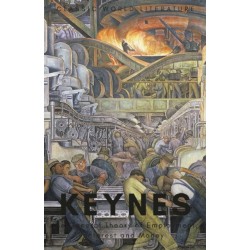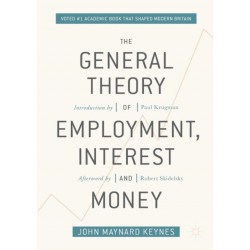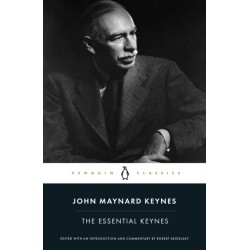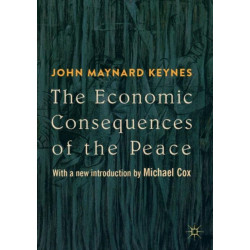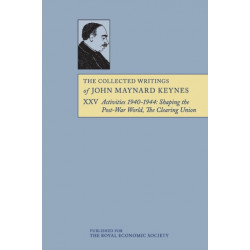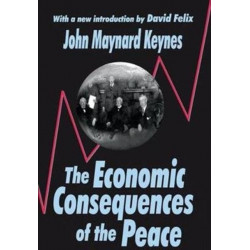Ingen varer
John Maynard Keynes Forfatter
Visning: Type : Alle | Sprog : Alle | Format : Alle
-
Bemærk: Kan leveres før jul.
The General Theory of Employment, Interest and Money: with The Economic Consequences of the Peace (Bog, Paperback / softback, Engelsk)John Maynard Keynes is perhaps the foremost economic thinker of the 20th century. He ranks with Adam Smith and Karl Marx; and his impact on how economics was practiced, from the Great Depression to the 1970s, was unmatched.
Levering: 6 - 9 hverdage -
Bemærk: Kan leveres før jul.
The General Theory of Employment, Interest, and Money (Bog, Paperback / softback, Engelsk)Levering: 6 - 9 hverdage -
Bemærk: Kan leveres før jul.
The General Theory of Employment, Interest, and Money (Bog, Paperback / softback, Engelsk)It was voted the top Academic Book that Shaped Modern Britain by Academic Book Week (UK) in 2017, and in 2011 was placed on Time Magazine's top 100 non-fiction books written in English since 1923.
Levering: 6 - 9 hverdage -
Bemærk: Kan leveres før jul.
The Essential Keynes (Bog, Paperback / softback, Engelsk)Features a selection of writings on economics, philosophy, social theory and policy.
Levering: 6 - 9 hverdage -
Bemærk: Kan ikke leveres før jul.
The Economic Consequences of the Peace: With a new introduction by Michael Cox (Bog, Paperback / softback, Engelsk)Scholarly yet engaged and readable, Cox’s introduction to the work – written a century after the book first hit the... Læs mere
Levering: Skaffevare (forvent 14 - 30 hverdage) -
Bemærk: Kan ikke leveres før jul.
The Collected Writings of John Maynard Keynes (Bog, Paperback / softback, Engelsk)This volume presents ideas of continuing relevance: essential material on the origins of the International Monetary Fund and World Bank.
Levering: Print on Demand (forvent 14 - 30 hverdage) -
Bemærk: Kan ikke leveres før jul.
The Collected Writings of John Maynard Keynes (Bog, Paperback / softback, Engelsk)The earliest articulation of Keynes's fundamentally new ideas in monetary theory. An important precursor to the General Theory.
Levering: Print on Demand (forvent 14 - 30 hverdage) -
Bemærk: Kan ikke leveres før jul.
The Collected Writings of John Maynard Keynes (Bog, Paperback / softback, Engelsk)The earliest articulation of Keynes's fundamentally new ideas in monetary theory. An important precursor to the General Theory.
Levering: Print on Demand (forvent 14 - 30 hverdage) -
Bemærk: Kan ikke leveres før jul.
The Collected Writings of John Maynard Keynes (Bog, Paperback / softback, Engelsk)A clear exposition of Keynes's ideas about the currencies of Europe and their adjustment to the post-war world.
Levering: Print on Demand (forvent 14 - 30 hverdage) -
Bemærk: Kan ikke leveres før jul.
The Economic Consequences of the Peace (Bog, Hardback, Engelsk)John Maynard Keynes, then a rising young economist, participated in the Paris Peace Conference in 1919 as chief representative of the British Treasury and advisor to Prime Minister David Lloyd George
Levering: Skaffevare (forvent 14 - 30 hverdage) -
Bemærk: Kan ikke leveres før jul.
The Collected Writings of John Maynard Keynes (Bog, Paperback / softback, Engelsk)This volume covers aspects of Keynes's involvement in the management of Britain's war economy from 1939 to 1946.
Levering: Print on Demand (forvent 14 - 30 hverdage) -
Bemærk: Kan ikke leveres før jul.
The Collected Writings of John Maynard Keynes (Bog, Paperback / softback, Engelsk)Papers relating to Keynes's work from 1906-14 on problems of Indian currency, a companion to his own Indian Currency and Finance.
Levering: Print on Demand (forvent 14 - 30 hverdage)

